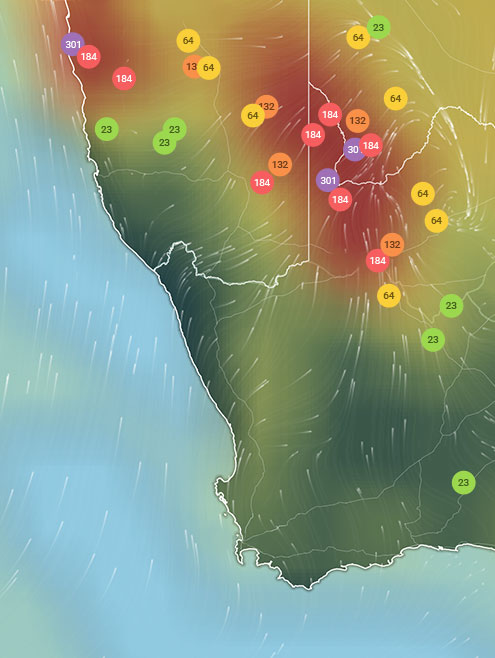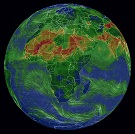Get a monitor and contributor to air quality data in your city.
7.2K people follow this city






AIR QUALITY DATA CONTRIBUTORS
Find out more about contributors and data sources| Weather | Broken clouds |
| Temperature | 51.8°F |
| Humidity | 65% |
| Wind | 6.9 mp/h |
| Pressure | 29.8 Hg |
| # | city | US AQI |
|---|---|---|
| 1 | Gwangju, Gwangju | 101 |
| 2 | Anyang, Gyeonggi-do | 87 |
| 3 | Jangseong, Jeollanam-do | 77 |
| 4 | Yesan, Chungcheongnam-do | 76 |
| 5 | Siheung, Gyeonggi-do | 75 |
| 6 | Asan, Chungcheongnam-do | 74 |
| 7 | Boryeong, Chungcheongnam-do | 72 |
| 8 | Suwon, Gyeonggi-do | 72 |
| 9 | Bucheon, Gyeonggi-do | 70 |
| 10 | Yongin, Gyeonggi-do | 70 |
(local time)
SEE WORLD AQI RANKING
| # | station | US AQI |
|---|---|---|
| 1 | Haengsin-dong | 68 |
| 2 | Juyeop-dong | 55 |
| 3 | Baengma-ro | 53 |
| 4 | Siksa-dong | 45 |
| 5 | Sinwon-dong | 33 |
(local time)
SEE WORLD AQI RANKINGUS AQI
53
live AQI index
Moderate
| Air pollution level | Air quality index | Main pollutant |
|---|---|---|
| Moderate | 53 US AQI | PM2.5 |
| Pollutants | Concentration | |
|---|---|---|
| PM2.5 | 13µg/m³ | |
| PM10 | 25µg/m³ | |
PM2.5
x2.6
PM2.5 concentration in Goyang is currently 2.6 times the WHO annual air quality guideline value
| Sensitive groups should reduce outdoor exercise | |
| Close your windows to avoid dirty outdoor air GET A MONITOR | |
| Sensitive groups should wear a mask outdoors GET A MASK | |
| Sensitive groups should run an air purifier GET AN AIR PURIFIER |
| Day | Pollution level | Weather | Temperature | Wind |
|---|---|---|---|---|
| Saturday, Apr 20 | Moderate 56 AQI US | 62.6° 51.8° | ||
| Sunday, Apr 21 | Moderate 54 AQI US | 62.6° 55.4° | ||
| Monday, Apr 22 | Moderate 59 AQI US | 71.6° 57.2° | ||
| Today | Moderate 53 AQI US | 71.6° 51.8° | ||
| Wednesday, Apr 24 | Moderate 66 AQI US | 59° 51.8° | ||
| Thursday, Apr 25 | Moderate 84 AQI US | 69.8° 51.8° | ||
| Friday, Apr 26 | Moderate 83 AQI US | 75.2° 57.2° | ||
| Saturday, Apr 27 | Moderate 67 AQI US | 77° 59° | ||
| Sunday, Apr 28 | Moderate 76 AQI US | 75.2° 60.8° | ||
| Monday, Apr 29 | Moderate 71 AQI US | 77° 62.6° |
Interested in hourly forecast? Get the app
Goyang is a city in South Korea, located in Gyeonggi province in the northern region of the country. With its close proximity to the capital, Seoul, it is counted as one of its many satellite cities, being one the largest amongst them with over one million inhabitants.
It is a reputed hub for institutions of higher learning, and as such would be home to many students and academics from round the country. Despite not having an overwhelming amount of factories or a large industrial sector, it still manages to have somewhat high pollution levels, with yearly averages that come in fairly high for a well-developed nation.
In 2019 Goyang came in with a PM2.5 reading of 24.9 μg/m³, putting it into the ‘moderate’ pollution ratings bracket, one which requires a PM2.5 reading of anywhere between 12.1 to 35.4 μg/m³ to be classified as such. It is on the higher end of this spectrum, and despite the group ratings name of being moderate, these levels of air pollution still have the chance to cause a wide range of detrimental effects to its citizens, particularly during months that see heightened levels of pollution, which will be discussed in short.
Any reading that comes in over the World Health Organizations (WHO's) target goal of 10 μg/m³ or less has the chance to cause adverse health issues, and as such Goyang can be said to have a level of air quality that could certainly be improved upon. Its reading of 24.9 μg/m³ placed it in 60th place out of all cities ranked in Korea (pertaining to South Korea of course), as well as 624th place out of all cities ranked worldwide.
As a satellite city of Seoul, it would subsequently see a large amount of its pollution arising due to being in close proximity, with many people living in Goyang finding employment in the capital city, as is common in many cities around the world, with cities just outside the capital often having considerably lower rents, higher quality of life and less overcrowding and other related issues.
As a result of this, the large amount of vehicles moving in and out of Goyang would almost certainly be a contributing factor to the high amounts of pollution that the city bears witness to. Another issue that is somewhat contentious is the discussion of pollution from both China and Mongolia being blown over to Korea via strong western winds, with both man made pollutants as well as the sandstorms and fine particulate matter making their way across the sea and settling over Koreas skies, causing an increase in respiratory related problems, but as mentioned this is a topic which is contentious in its nature, with some experts weighing in that much of Koreas pollution is a homegrown problem, although the issue is not fully determined as of yet.
Other causes of pollution would be factories, and as mentioned despite not having a massive amount of them within the city limits, even a few coal powered stations are enough to bring the pollution levels up considerably, particularly during certain months when meteorological conditions such as lack of wind, humidity levels and other factors can cause the pollution to accumulate and fail to disperse, causing the large spikes in PM2.5 as seen in certain months.
Observing the data taken over the course of 2019 as a good indicator of when Goyang is subject to its worst qualities of air, a pattern quickly emerges when looking at all the months on record. As with many cities in Korea, they all follow a very similar pattern of considerably higher PM2.5 readings in the earlier portion of the year, with the pollution levels starting to take a turn for the worst around November or December of the previous year.
To demonstrate, October came in with a PM2.5 reading of 14.6 μg/m³, followed by a jump up to 20 μg/m³ in November and then a further jump in December with a reading of 26.5 μg/m³. It is during the early months of the year where the pollution levels start to rise to a more dangerous degree, with January through to March having the worst readings of the entire year. They came in at 38.7 μg/m³, 34.1 μg/m³ and 45.4 μg/m³ respectively, making March the most polluted month of the entire year and also falling into the ‘unhealthy for sensitive groups’ bracket, which requires a PM2.5 reading of anywhere between 35.5 to 55.4 μg/m³ for classification.
To follow on directly from the previous question, the time of the year when Goyang would be the freest from haze, smog, smoke and other dangerous fine particulate matter in the air, would be when the PM2.5 levels start to abate after March, albeit with a sudden raise occurring again in May but then dropping back down again.
Subsequently, the months of April through to November (excluding the anomaly of May) are when pollution levels are at their best in Goyang, with a further narrowing down of these pollution cessations occurring from the months of August through to October, which came in with readings of 15.1 μg/m³, 11.2 μg/m³ and 14.6 μg/m³ respectively, making September the cleanest month out of the entire year and the only one to fall within the ‘good’ ratings bracket, which requires a very fine margin of entry at 10 to 12 μg/m³ units required, being only 1.2 units away from achieving the coveted WHO's target goal for the best quality of air at 10 μg/m³ or less.
With PM2.5 readings going as high as 45.4 μg/m³, and many months of the year coming in at the higher end of the moderate ratings bracket, there would be some health risks associated with breathing polluted air in Goyang, with other determining factors such as age, health background as well as lifestyle and daily routines all playing a part. Those who live near to industrial areas or busy roads, as well as taking daily commutes through busy roads are often the most susceptible, along with any accompanying preexisting health issues.
Some problems that may arise as a result are irritation to the eyes, nose, throat and ears, with the skin also being affected by certain chemicals in the air. Irritation to the respiratory tract can occur, with raised instances of cancer in both the lungs and throat. Fine particulate matter released from cars and factories can penetrate deep into the lung tissue, causing rapid aging and scarring, as well as increased susceptibility towards respiratory ailments such as pneumonia, bronchitis, emphysema and asthma.
There are numerous issues related to other organ systems, but they will not be covered here due to the extremely wide range of issues possible. The take away point is that any level of pollution above 10 μg/m³ has the chance to cause gravely negative effects, and as such all citizens should consider staying up to date on pollution levels via air quality maps, such as the ones found on the IQAir website as well as the AirVisual app. This will help people to stay informed about the quality of the air, and what measures need to be taken, such as avoiding outdoor activities or wearing fine particle filtering masks to reduce the negative impact that pollution has on health.
2Contributors
2 Government Contributors
5 stations
5 stations
2 Data sources